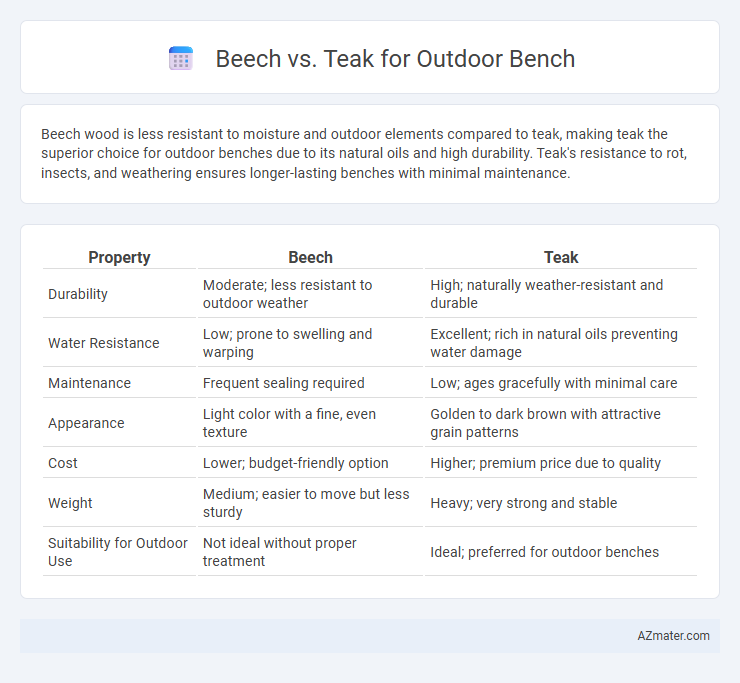Beech wood is less resistant to moisture and outdoor elements compared to teak, making teak the superior choice for outdoor benches due to its natural oils and high durability. Teak's resistance to rot, insects, and weathering ensures longer-lasting benches with minimal maintenance.
Table of Comparison
| Property | Beech | Teak |
|---|---|---|
| Durability | Moderate; less resistant to outdoor weather | High; naturally weather-resistant and durable |
| Water Resistance | Low; prone to swelling and warping | Excellent; rich in natural oils preventing water damage |
| Maintenance | Frequent sealing required | Low; ages gracefully with minimal care |
| Appearance | Light color with a fine, even texture | Golden to dark brown with attractive grain patterns |
| Cost | Lower; budget-friendly option | Higher; premium price due to quality |
| Weight | Medium; easier to move but less sturdy | Heavy; very strong and stable |
| Suitability for Outdoor Use | Not ideal without proper treatment | Ideal; preferred for outdoor benches |
Introduction: Beech vs Teak for Outdoor Benches
Beech and teak are popular hardwood choices for outdoor benches, valued for their durability and aesthetic appeal. Teak naturally resists moisture, decay, and insect damage due to its high oil content and dense grain, making it ideal for outdoor use. Beech, while strong and smooth, requires proper sealing and maintenance to withstand outdoor elements effectively.
Wood Characteristics: Beech and Teak Explained
Beech wood offers a fine grain and smooth texture but lacks natural oils, making it more susceptible to moisture and weather damage in outdoor conditions. Teak wood is renowned for its high natural oil content and dense grain, providing exceptional resistance to rot, insects, and warping, ideal for outdoor furniture longevity. The durability and weather-resistant properties of teak significantly outperform beech, making teak the preferred choice for outdoor benches exposed to varying climates.
Durability and Weather Resistance Comparison
Beech wood offers moderate durability for outdoor benches but requires frequent sealing to resist moisture and prevent decay, making it less ideal for prolonged exposure to harsh weather. Teak wood stands out with exceptional natural oils that provide superior weather resistance, ensuring longevity and minimal maintenance in outdoor environments. Its high durability and resistance to rot, insects, and warping make teak the preferred choice for outdoor furniture subjected to varying climates.
Maintenance Requirements: Beech vs Teak
Beech wood requires regular sealing and occasional sanding to prevent moisture damage and maintain its appearance, making it more maintenance-intensive for outdoor benches. Teak naturally contains oils that provide excellent resistance to weather, pests, and rot, reducing the need for frequent maintenance. Proper care for teak typically involves minimal cleaning and periodic oil treatments to preserve its rich color and durability.
Appearance and Aesthetic Appeal
Beech offers a light, pale color with a fine, uniform grain that provides a smooth and contemporary look suited for minimalist outdoor benches. Teak features a rich golden-brown hue with a distinctive grain pattern that deepens in color over time, lending a warm, classic elegance and natural weather resistance. The natural oils in teak enhance its durability and maintain its aesthetic appeal despite exposure to outdoor elements, whereas beech may require more maintenance to preserve its appearance.
Cost Analysis: Beech and Teak Benches
Beech benches typically cost less than teak benches, making them a budget-friendly option for outdoor furniture without compromising on durability. Teak benches command a higher price due to their natural oils that provide superior resistance to weather, insects, and decay, extending their lifespan significantly. Investing in teak offers long-term value despite the upfront expense, while beech benches require more maintenance and protective treatments to ensure longevity in outdoor settings.
Comfort and Practicality for Outdoor Use
Beech wood offers a smooth texture and moderate hardness, providing comfortable seating but requires regular treatment to prevent weathering and moisture damage outdoors. Teak is renowned for its natural oils and high durability, making benches highly resistant to rot, insects, and warping, which enhances long-term practicality and comfort in various weather conditions. While teak demands less maintenance, making it ideal for outdoor benches, beech is more affordable but needs frequent sealing to maintain comfort and structural integrity.
Eco-Friendliness and Sustainability
Beech wood, sourced primarily from European forests, offers a quicker growth cycle compared to tropical teak, making it a more sustainable choice for outdoor benches due to faster regeneration. Teak, renowned for its natural oils and durability, requires longer maturation periods and is often harvested from tropical rainforests, raising concerns about deforestation and environmental impact unless certified by organizations like FSC. Choosing FSC-certified beech or sustainably sourced teak ensures minimized ecological footprint while maintaining the quality and longevity essential for outdoor furniture.
Best Applications for Each Wood Type
Beech wood offers excellent shock resistance and a smooth finish, making it ideal for indoor or covered outdoor benches where moisture exposure is limited. Teak wood's natural oils and high durability provide superior weather resistance, perfect for fully exposed outdoor benches in humid or rainy environments. Choosing teak ensures longevity and low maintenance for garden benches, while beech suits sheltered patio seating where aesthetic detail is a priority.
Conclusion: Choosing the Right Wood for Your Outdoor Bench
Beech offers a cost-effective and smooth finish but is less durable and more prone to moisture damage compared to teak, which is naturally resistant to rot, insects, and weathering. Teak's high oil content and dense grain make it ideal for outdoor benches, providing long-lasting durability and minimal maintenance. Choosing teak ensures longevity and weather resistance, while beech suits budget-conscious projects with protective finishes and regular upkeep.

Infographic: Beech vs Teak for Outdoor Bench
 azmater.com
azmater.com